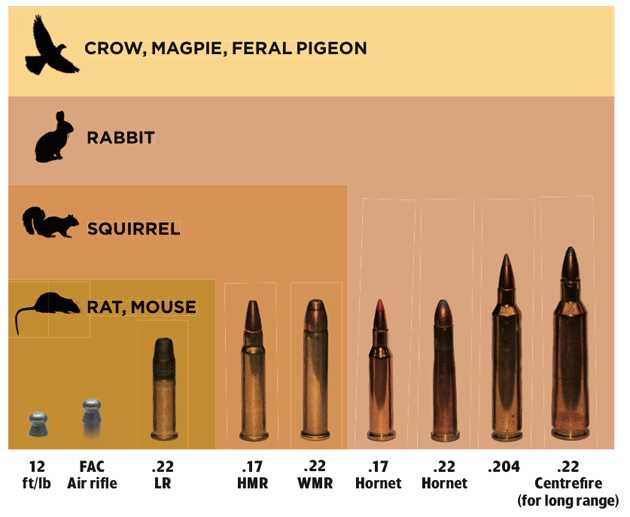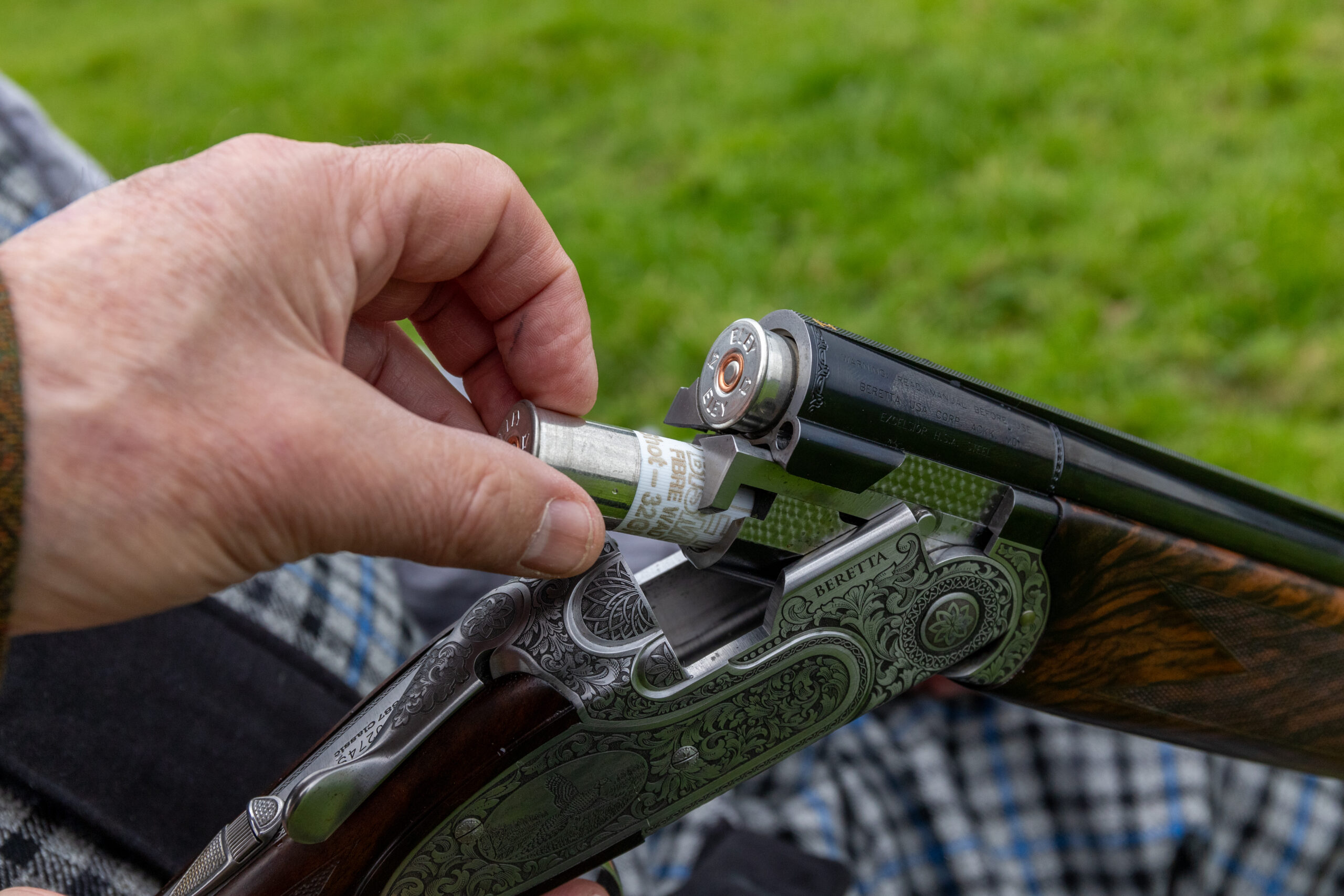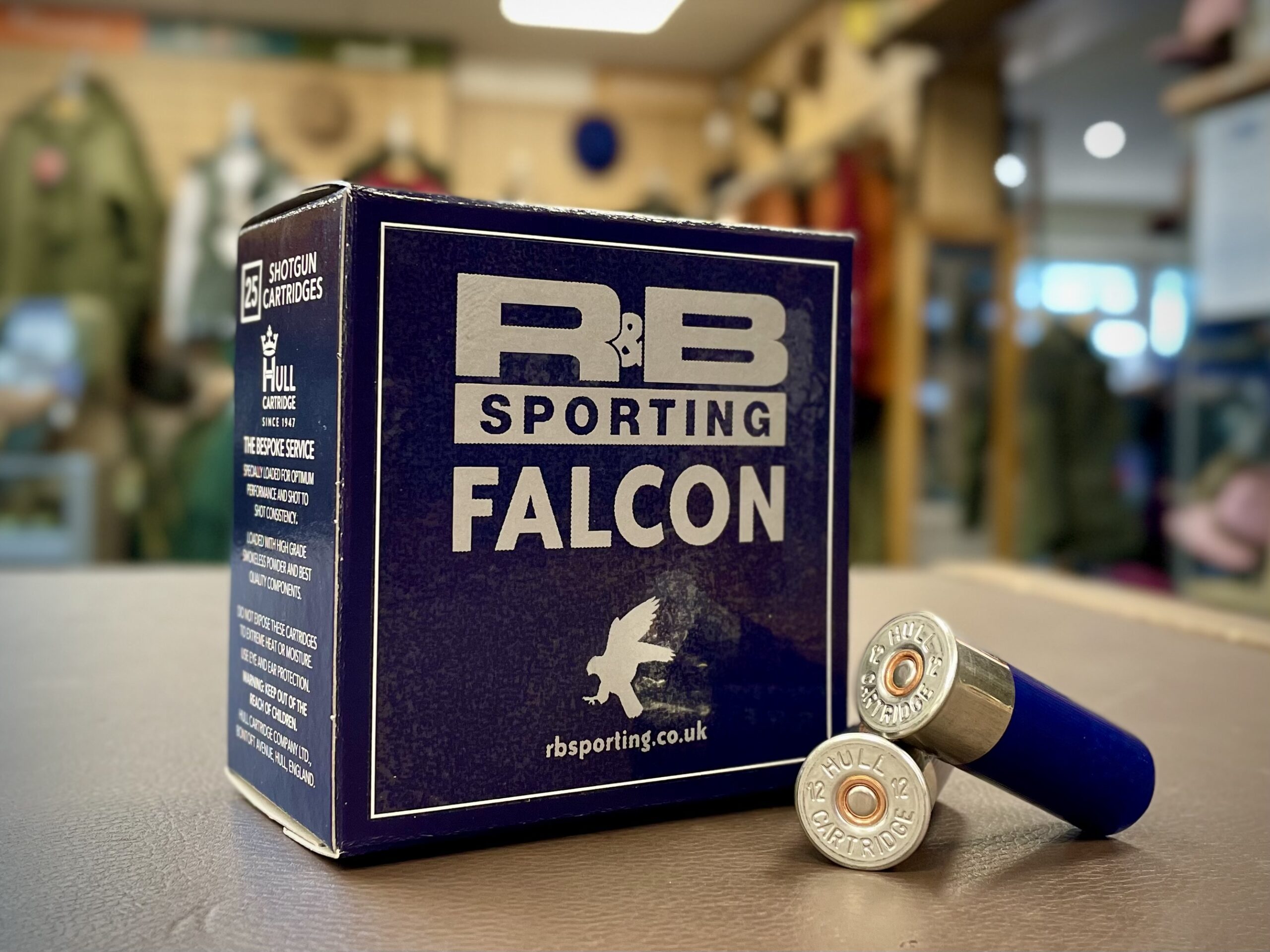Cartridges and calibres for pest control
Pest control can cover rats, foxes, crows, rabbits ... Bruce Potts guides you through the options

Wondering what is the best calibre for foxes? Rabbits?
There are so many different species of pests – you can’t band together a rabbit and a fox – that you can’t have a single calibre for them all.
So instead I am going to take a look at the various pest control cartridges that are on offer and how useful the different calibres are.
When you’re controlling smaller pests
For small pest control work an air rifle would be my choice.
I shoot as much small game with an air rifle, both sub-12ft/lb and an FAC air rifle, as I do with a rimfire. So for small pest control work I could recommend an air rifle.
But as regards pest control cartridges I’d say opt for the .22 rimfire.
The .22 rimfires differ and there is a choice of loads. Personally I use a huge variety of .22 rimfire cartridges, from the tiny squib bulleted breach (BB) caps to the relatively hefty .22 Winchester Magnum Rimfire (WMR) loads. Each has its own particular talents and uses.
BB and conical ball (CB) caps are single-shot only but very useful for mice, rats or ferals in confined spaces. Their maximum effective range is 10 yards. Beyond that they are not accurate enough, but they shoot 15.5-gr and 16-gr bullets at 880fps and 950fps for 27ft/lb and 33ft/lb energy respectively.
Better are the little .22 Shorts. These can be reduced velocity at 710fps as with the CCI CB load, or you can have a standard load that shoots a 27-gr bullet at 1,105fps. In a pump-action Winchester they are excellent for dealing with squirrels.
Possibly my first choice are the CB Long loads that feed through a standard magazine bolt-action rifle and send a 29-gr bullet at 705fps for 32ft/lb — basically a rimfire version of an FAC air rifle in some respects. The effective range is 20 yards at best but it’s quiet with a sound moderator fitted.
Best calibres for rabbits
My first choice as an all-rounder on rabbits are the .22 LR subsonic loads. Here hollowpoint bullets ensure maximum expansion of the bullet and delivery of the bullet’s energy into the vital area for a humane shot. You should still be aiming for head shots though. The .22LR high velocity (HV) has its place if you really have to use a .22LR for foxes, but keep these ranges short and take head shots only. Velocities of 1,245fps to 1,650fps can be achieved, but with lighter bullets that lose velocity quickly.
You’ll find 40-gr subsonic bullets from any of the manufacturers such as RWS, Eley, Winchester or CCI that will deliver approximately 95ft/lb. It is the rifle that chooses the bullets it likes, not you. No one manufacturer is a better choice than another.
If you have a semi-automatic .22 rimfire then dependability is important and the new RWS Semi Auto cartridge is superb. Yes it is a solid bullet, not hollowpoint, but as head shots are the norm, it is of no consequence.
 Best calibres for shooting foxes
Best calibres for shooting foxes
A .22LR can be deadly against a fox at short range and with higher velocity ammunition, as long as you place head shots accurately. After 50 yards range however, you’re unlikely to get a humane shot. I have called in and baited foxes in barn areas and used .22 rimfires to good effect, but the .17 HMR is best if you don’t want a centrefire.
The 17-gr V-Max bullet for the HMR is the most common and is certainly capable of despatching a fox humanely, but at sensible ranges and with good shot placement. I prefer the CCI 20-gr GamePoint load, as it’s accurate, and the extra weight and slower expansion helps penetrate the fox’s exterior before delivering its energy, whereas a more fragile .17 HMR 17-gr bullet might fragment on a bone on its way in.
Alternatively, the older .22 WMR — the inspiration behind the .17 HMR — is still a good fox cartridge. The Hornady 30-gr V-Max load is effective at closer ranges with a velocity of 2,200fps and striking energy of 322ft/lb.
Better still is the .17 Hornet round. This round is actually similar to the old .17 AK Hornet but it lets you use a lightweight rifle with the availability to reload your ammunition to suit your need and game species. Here a 20-gr bullet can be pushed at 3,650fps for 592ft/lb energy, a good flat-shooting bullet for rabbits, crows and foxes.
This brings you nicely to the .22 Hornet — old but still a cracking little round. The advantage here is you can up the bullet weights over the .17 and there are a lot of ammunition or reload choices. RWS makes a good factory loading, while I have always liked a reload recipe of 35-gr V-Max bullet with 11 grains of Vit N110 for 3,050fps.
Bigger guns
Realistically, a centrefire is usually the most suitable for anything larger than a hare. The newer .204 Ruger is a capable round delivering a blend of higher ballistic coefficient bullets for better down-range performance and accurate shot placement. Either a 32-gr or 40-gr factory load is effective, with velocities of 4,225fps and 3,900fps respectively. The 32-gr bullet zeroed at 100 yards is still within the kill zone of a fox at 275 yards.
Next up are the old retainers, .222 Rem, .223 Rem, .22-250 and the .220 Swift rounds. The .222 Rem is a wonderful round — sweet to shoot, low recoil, accurate and available in a wide variety of lighter weight or heavy varmint rifle configurations. With a sound moderator fitted you have yourself a quiet effective fox round to 250 yards or so and it doubles up as a small species deer round, with the correct bullets.
I like the Norma 40-gr V-Max factory load at 3,051fps and 1,137ft/lb is an accurate round with reloads such as the 55-gr Sierra soft nose bullet on top of 25-gr of Varget powder for 3,095fps and 1,170 ft/lb. If you want a tad more range or want to use a heavier bullet then the .223 Rem is an excellent choice. Slightly bigger than the .222, the .223 is great for small game or foxes. You can load with bullets as light as 30-gr up to 90-gr if necessary. But you will need a rifle with fast-twist rifling, 1-in- 9in or 1-in-7in to stabilise bullets above 70-gr as the standard 1-in-12in is only good for the lighter bullets. Regardless, the .223 Rem does everything the .222 Rem does but just that little bit better. A good load is 40-gr V-Max and 25-gr of RL10X for 3,750fps for smaller game giving accurate longer-range shots if necessary and safer more frangible bullets, while a load of 23.5 grains of Vit N133 and a 50-gr Berger Varmint gives 3,400fps plus and is ideal for foxes. I’ve been using .223 GECO 56- gr Express factory ammo with excellent results on small game and on foxes.
Then there’s a big change in size to the .22-250 round, which is the old .250 Savage round necked down to .224 calibre. You can use the .22-250 two ways: a superb flat-shooting long- range small vermin round with a 40-gr bullet travelling at 4,100fps delivering 1,493ft/lb — excellent for watchful crows at long range. Then load a heavier bullet such as the 55-gr V-Max and you have a good short or longer-range fox load.
The extra speed of the .22-250 over the smaller .222 or .223 rounds means a flatter trajectory so less sight adjustment and less wind drift — more chance of a good hit. The downside is more noise and a little more recoil, both of which you can reduce by fitting a good sound moderator. Also if you reload a .22-250 you can reduce the load to a .223 level for shorter or smaller game if necessary, but you can never load a .223 to the velocity of a .22-250.
Similarly the big .220 Swift is an old one but still a good one, delivering a 50-gr bullet at 3,950fps for 1,732ft/lb. Whilst I like it, I have to say that a .22- 250 is more practical as more rifles are chambered in it.
Foxing question
Q: I’ve recently bought a .223 for foxes. I was wondering what would be the best distance to zero it at and what the best weight of ammunition is?
(Mark Ripley answers) A: I’m a big fan of the .223 as a foxing round as it’s pretty flat-shooting with lighter ammunition. In fact, using 35-gr ammunition, it performs much like the .204.
First, bullet weight will depend on the barrel twist. As a rule, the .223 should shoot well with 50-gr to 55-gr ammo. This is a good bullet weight for foxes. If you zero an inch high at 100 yards then, give or take, you will be bang on at 50 yards and at 200 yards.
This means that, realistically, you should be able to point and shoot at a fox out to around 250 yards. This makes for a very forgiving range, especially if shooting at night when judging range can be difficult.
I would recommend a ballistic-tip bullet for foxing to give good, humane kills. For me, the Hornady Superformance 53-gr ammo proves accurate and devastating from most rifles that I’ve tested it through.
Remember
After choosing the appropriate ammunition, ensure your ranges are realistic, you have the right rifle for the quarry and your shot placement is accurate.
A good .22LR will sort you for all your small game issues, a .17 HMR bridges the gap between small game and foxes (with the right ammo and at shorter ranges) while a good centrefire is really the best for foxes. Plus a .22 centrefire can double as a small species deer rifle with the right ammunition.
I have missed out the .17 Rem, .17 Fireball and many .20 cal wildcats. However the ones I have detailed here are in the most common use.
Some shotgun pest control cartridges
A shotgun is effective at short ranges and in some circumstances is most suitable.
Cartridges for foxes
Charlie Fox is probably our most destructive enemy and one that takes up a keeper’s time year after after.

Carrion crow
Cartridges for corvids
Carrion crows and magpies build strong nests. Even if you use a heavy load you will need to take a few shots to destroy the nests and the contents. These are clever birds and the adults are persistent. They will come back to repair their nests so keep an eye out and keep going. For a magpie, any 20 or 30g load of No. 6 shot will be ideal.
You will need a bit more power for a carrion crow. Gamebore Super Game High Bird in 5 shot is ideal.
Pest control cartridges for rats
Rats congregate inside barns and rearing sheds. In these locations I would use the Eley Hawk two inch .410, which delivers a 9gm payload of No. 6 shot.

Eley Hushpower
Keeping it quiet
If you’re concerned about neighbours and want to keep the sound down when using pest control cartridges, take a look at subsonic loads. You will also have less recoil with these. Muzzle velocity in all cases is approx 1050 fps, just below the 1084fps speed of sound at sea level.
For 12-bore try the Eley Hushpower in a 32g fibre 6 shot.













